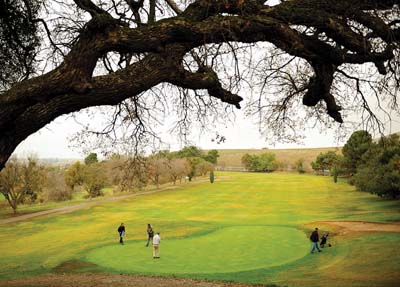The Bolado Park Golf Course closed for three days last week
before re-opening Monday after the financially troubled club
received a loan that should keep it operating
”
minimally
”
until the state makes a decision Jan. 11 on altering the lease,
a board member said.
The Bolado Park Golf Course closed for three days last week before re-opening Monday after the financially troubled club received a loan that should keep it operating “minimally” until the state makes a decision Jan. 11 on altering the lease, a board member said.
The course, which opened in 1946 and is the oldest in San Benito County, has faced declining membership and revenues while operating under a deficit for about the past decade. Club officials in mid-December warned that board members had been considering a closure to the club and encouraged donors to help, or it could face demise. In particular, they noted the $25,000 annual lease with the 33rd Agricultural District that owns Bolado Park and the nearby course property – and the need to have the price tag lowered.
Club officials last week made that decision to close the 9-hole Bolado Park Golf Course because they “had no options” left, said board member Phyllis Swallow on Monday. It was closed for three days over the weekend but re-opened Monday after a donor came forward with a loan expected to fund operations until Jan. 11, she said. As part of the closure and re-opening, the club’s former operations head, PGA General Manager Steve Janisch, departed from his position.
As for the Jan. 11 meeting, that is when the state agricultural district’s board is set to meet again and consider options with the lease. The state board already has made a concession on the section in the contract with the club that had allotted a percentage of gross revenues to the agricultural district on merchandise and other sales. Bolado Park Golf Course, meanwhile, operates under a five-year lease that is scheduled to continue on after Jan. 11.
“We’re trying very, very hard to keep it open,” Swallow said. “We’ve been here since 1946. We want to keep the course open. We want to honor our members’ fees they’ve paid.
“We’re cutting our cost to the bare minimum. We are hoping that people understand the state we’re in.”
Swallow noted how the course is remaining “minimally open” through the help of both paid and volunteer staff members. The hope is that between now and Jan. 11, they might receive the necessary, charitable help – or further concessions by the state – to keep the proverbial doors open.
“We’re supposed to have a good week of weather,” Swallow said. “We’re hanging on by tooth and nail.”
Even after club leaders warned of a possible closure in December, she said they “just weren’t getting donations.”
“People weren’t paying their dues because they were concerned” how long the golf would be available there, she said. “We can’t take people’s money and not be able to assure them they’re going to be able to play golf.”
And while the club survives for the next week under the loan arrangement, it no longer has a general manager, as Janisch left last week.
“I’m no longer there,” he said by phone Monday. “They’ll have to be the main spokesman. Basically, I’m a main creditor of them now is what it amounts to.”
Janisch was among the club officials who warned in December of the financial troubles.
Those problems started around 2000 for the course built on land deeded to the state in perpetuity with a guarantee it remains used for recreational purposes.
One of the bigger downfalls has been an aging population. Membership has dropped from around 300 in the late 1990s to about 150. In recent times, membership has taken a 20 percent to 25 percent hit annually, Janisch has noted. But other deterring factors have included added competition, with San Juan Oaks Golf Club built in 1996 and Ridgemark Golf & Country Club expanding its hole offerings.
Bolado Park’s grounds’ quality declined through the years, particularly the cart paths, bunkers and irrigation system.
For the agricultural district, Fair Manager Kelley Ferreira last month pointed out how the state already had conceded on the percentage of revenues, and regarding the lease amount noted that it can’t “just give it away.”










